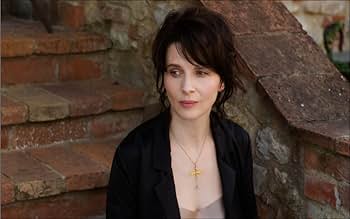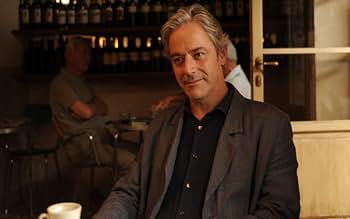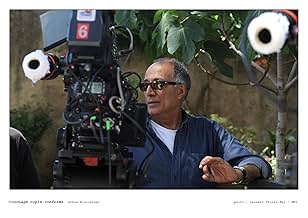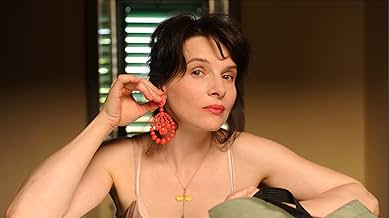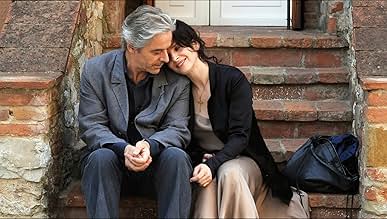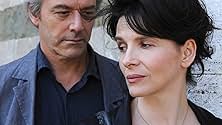Para promover seu último livro, um escritor britânico conhece uma francesa que o leva até a aldeia de Lucignano. Onde uma pergunta casual revela algo mais profundo.Para promover seu último livro, um escritor britânico conhece uma francesa que o leva até a aldeia de Lucignano. Onde uma pergunta casual revela algo mais profundo.Para promover seu último livro, um escritor britânico conhece uma francesa que o leva até a aldeia de Lucignano. Onde uma pergunta casual revela algo mais profundo.
- Direção
- Roteiristas
- Artistas
- Prêmios
- 11 vitórias e 29 indicações no total
- Le marié
- (as Filippo Troiano)
- La mariée
- (as Manuela Balsinelli)
- Direção
- Roteiristas
- Elenco e equipe completos
- Produção, bilheteria e muito mais no IMDbPro
Avaliações em destaque
It has originality - it will not be like other films seen recently in mainstream European cinema, there is little or no plot, or action, rather we dealing with conversation, and the state of the heart and the mind in a fiercely non-Hollywood fashion. This is a film about thinking about emotions, and is almost non-linear in its conversations and if that concept doesn't appeal then it may well not be viewable.
It is, however, despite itself, pretty mesmerizing - what will they say next? what other aspect of why relationships fail and succeed will be tossed into the salad? who are they? why the games? etc;
The conversations are both alienating and intimate, and have a "play-acting" aspect that allows the psychosexual aspect of how we adults explore potentiality to be examined in a way that is normally reduced to sexual tension and flirting on film. This is a film that demands attention - this is not dumb film-making. I recognize the conversations and the feeling well, but in a sense the connection is too contrived to be really successful - but it certainly touches that part of intimacy that is normally, at best, ethereal.
The setting of Chianti and a beautiful hot summer day, with cicadas and a wonderful small town to explore, lightens this - but it remains a film for philosopher romantics. It is, as others here have noted in better ways than me, film as film - here there are images and shots that work to compliment the alienation and solipsistic nature of the two leads.
A film about questions that offers few answers, it is certainly intriguing and if you are into human exploration and condition worth the effort to watch.
Not entirely convincing, but an excoriating watch nonetheless. When this film was finished, I felt like I had just witnessed an entire relationship, from the first fruitful seeds, to infatuation and love and friction and wear and decay, and in a sense I had because that is essentially what the two characters of the film take us through. The film begins with William Shimell, playing the role of modest and charming British academic who is promoting his book in Italy. The idea of this book gives the film its title and what the whole film begins to play around with: the copy. The copy, and it's relation to the original, its authenticity, and whether one should invest any time in an original if a recreation is believable. He would answer 'no' to that last thought. Juliette Binoche appears at his speech, leaves his translator a note, and the next day he appears at her small museum/exhibition/trinket shop, artistic debate is continued, and thus their journey begins. The boundaries of conversation between two people who are seemingly strangers soon dissolves and they are soon fluctuating between moments of bitterness, delight and contemplation, and soon enough in what appears to be a bizarre role-play, the assume the role of a married couple and any façade that they try to wear is soon being flayed.
Binoche is utterly captivating and her award for Best Actress at Cannes is entirely deserved. She is seemingly inexhaustible, communicating in Italian, French and English and losing no degree of vulnerability, bitterness or magnetism between the languages, and she has a remarkable way of kind of softly inhabiting any given situation but being able to turn caustic and uncomfortable with immediacy. There are moments when the characters are sitting opposite each other in conversation and they are speaking directly into the camera, and when Binoche does this it's never less than transfixing.
Shimmel, for a first time actor is for the most part quite grounded and reserved, but it's with him that the film often feels at its flattest. He's the more outwardly ruminating intellectual, always approaching things with a contemplative thought, and it often feels like the film is struggling to maintain a deep thought, as if in fear of being mocked for being nothing less than poetic. Maybe that's the way the character is supposed to be, but all his affectations get tiring. He comments on Eucalyptus trees being so totally unique, how each one has its own shape and definition and being unlike the other one, and as truthful as it might be, it's just a comment that leaves you thinking 'And?' At other times the exchanges of these characters are scintillating, as when an innocuous pit-stop at a café becomes changes the gears of their relationship, and Binoche begins to furiously criticise his cool, charming bullshit-masquerade. The dialogue operates in these two modes, between fascinating and questionable, but never really finds its footing.
Abbas Kiarostami is clearly a man who knows exactly what he wants to do and how to do it, and at the jolly age of 74 all the wisdom and joy and despair he must have accumulated in his lifetime can be felt here, in the vivaciousness and the bitterness of the characters, in the way a camera can just sit and stay trained for minutes on end and let the people unfurl themselves, but sometimes it feels like all he is trying to much to do justice to all his collected experience in life. There's a shot toward the end with our couple standing in a courtyard together and just in front of them is a far older couple, man and wife, standing on the same side of each other, tentatively walking and supporting each other. The imagery is obvious but the connotations are beautiful, and it's the sort of a shot that could only have worked as aposiopesis to the journey preceding it. (Maybe that is the point)
So there was an ambivalence I felt throughout the film, but it's hard to dismiss something this lovingly made, as an expression of the melancholy of our relationships in life. There's a blustery and picturesque feel throughout this Italian journey that is hard to argue with.
The film forces us to wonder to what extent the relationship between the two central characters is real, or an imitation of a once real relationship. It asks is a real relationship any better than a certified copy i.e a fake relationship where both parties pretend it is real. That is the central question - the value of the authentic versus the value of the fake.
Or was it mistake? It becomes clear that these people have some connection with each other, whether they are divorced, former lovers or something entirely separate, and the conversation becomes much more biting and intriguing. Writer/director Abbas Kiarostami keeps us gripped into this conversation, as these two ponder on the copies of the world, along with the tribulations of a marriage, what makes a good husband, what makes a good father and so much more. She attacks him for being such an absent father (is her son really his?) and he explains that sometimes one partner in the marriage just has to be gone and that's the way the world is. The film poses so many interesting questions on the world and leaves it up to the viewer to decide the answers for themselves. Each character has their own strong opinion, but Kiarostami never takes a side and tells the viewer the resolution. It's a powerful picture that keeps you thinking long after it's over.
Part of the power of course relies on the strength of the performances, and both of these actors knock it out of the park. William Shimell was the perfect choice for the distant, simple author. Juliette Binoche, however, steals the show, with an authentic and brave performance that ranks up with some of her absolute best. She is arguably the finest actress in cinema today, and has a grasp on portraying vulnerability that very few actors can come close to achieving. Within her you really see the pain of a woman scorned and the exhausting life led by a single mother constantly having to think of someone other than herself. She is everything here; emotional, strong, falling apart and beautiful. It's a perfect performance in a magnificent film. I feel like this is a picture that will only get better on repeated viewings, and it's still quite strong on the first one.
Você sabia?
- CuriosidadesDuring a visit in Tehran by Juliette Binoche, Abbas Kiarostami told Binoche the synopsis of Certified Copy as a casual anecdote, which she said that she fully believed until he confessed to having made it up. According to Kiarostami, studying the reactions of Binoche as she listened to the story was a vital part of the film's further development.
- Citações
James Miller: It seems to me that the human race is the only species who have forgotten the whole purpose of life, the whole meaning of existence is to have fun, to have pleasure. And here is someone who's found their own way to do it. We shouldn't judge them for it. If they're happy and enjoying life, we should congratulate them, not criticize them.
- ConexõesFeatured in Breakfast: Episode dated 31 August 2010 (2010)
- Trilhas sonorasO surdato 'nnamurrato
Written by Aniello Califano (as A. Califano) and the music by Enrico Cannio (as E. Cannio)
Principais escolhas
- How long is Certified Copy?Fornecido pela Alexa
Detalhes
Bilheteria
- Orçamento
- € 7.000.000 (estimativa)
- Faturamento bruto nos EUA e Canadá
- US$ 1.373.975
- Fim de semana de estreia nos EUA e Canadá
- US$ 77.937
- 13 de mar. de 2011
- Faturamento bruto mundial
- US$ 7.736.632
- Tempo de duração
- 1 h 46 min(106 min)
- Cor
- Mixagem de som
- Proporção
- 1.85 : 1




